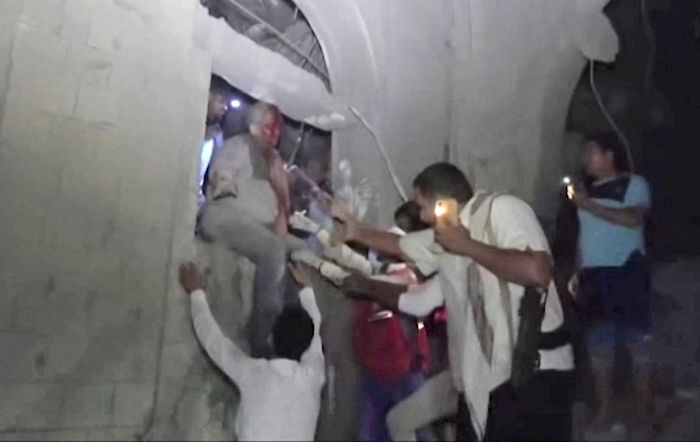A Saudi-led coalition airstrike on Friday on Houthi-controlled territory in Yemen hit a prison, the rebel group said, killing dozens and injuring scores of others.
It is the latest in a spate of attacks targeting the Iran-allied group after it claimed responsibility for deadly aerial attacks earlier this week on the United Arab Emirates, an alliance partner.
The airstrike hit a temporary detention center in Saada, a small town north of the country’s Houthi-controlled capital San’a, the rebels said. Around 200 people, including 70 who died, were transferred to the main hospital in Saada, forcing it to close its doors despite many bodies remaining at the scene of the strike, Doctors Without Borders, or MSF, said, adding that many people were missing.
“It is impossible to know how many people have been killed,” said Ahmed Mahat, MSF’s head of mission in Yemen. “It seems to have been a horrific act of violence.”
The Saudi coalition didn’t immediately take responsibility for the attack. The coalition is the only actor known to carry out airstrikes in the area.
“We take this report very seriously and it will be fully investigated,” said Brig. Gen. Turki al-Malki, the coalition spokesman said. “Whilst this is ongoing, it would be inappropriate to comment further.”
The airstrike, one of the deadliest of the entire conflict, is part of a dramatic, weeklong escalation of the seven-year war in Yemen amid stalled international attempts at brokering peace between the Houthis and the Saudi-led military coalition.
The renewed violence threatens to spill over into the broader region after the Houthis on Monday used missiles and drones to conduct a rare attack on Abu Dhabi, the capital of the U.A.E., a key member of the coalition. The attack caused explosions on fuel trucks and at a construction site in the airport, killing three civilians and sending shockwaves through a city that has built a reputation as a safe business haven in a volatile region.

The aftermath of the airstrike at the telecommunications building in Hodeidah.
Photo: -/Agence France-Presse/Getty Images
The Houthis said the attack on Abu Dhabi was to force the U.A.E. to stop its recent escalation in Yemen, where Emirati-backed militias last week recaptured the oil-rich province of Shabwa from the Houthis.
The coalition retaliated with days of airstrikes on Houthi-held areas, damaging water supplies, Yemen’s main airport and killing at least five civilians in San’a.
Also on Friday, a separate airstrike damaged a telecommunications building in the port city of Hodeidah, causing an internet blackout in the entire country, except for the southern city of Aden, which has an additional network. The Houthis said four people were killed in the Hodeidah attack. Airstrikes also targeted the airport in San’a.
The attack on the prison came a day after the United Nations envoy to Yemen, Hans Grundberg, visited the Saudi capital of Riyadh to denounce the recent escalation of violence.
“Airstrikes, missiles and drones, are continuing to claim civilian lives and damage civilian infrastructure, both in Yemen and in neighboring countries,” Mr. Grundberg said, after meeting, among others, Saudi Vice Minister of Defense Prince Khalid bin Salman and Yemeni Foreign Minister Ahmed Bin Mubarak.
“This is disrupting the prospects of a comprehensive political solution and exacerbating the humanitarian suffering in Yemen,” he said.
The Houthis said Friday that they would fight back.
“These massacres will prompt our people to respond in every possible way and with all their right and strength,” Houthi spokesman Mohammed Abdel Salam said on Twitter.
—Dion Nissenbaum contributed to this article.
Write to Sune Engel Rasmussen at [email protected]
Copyright ©2022 Dow Jones & Company, Inc. All Rights Reserved. 87990cbe856818d5eddac44c7b1cdeb8








